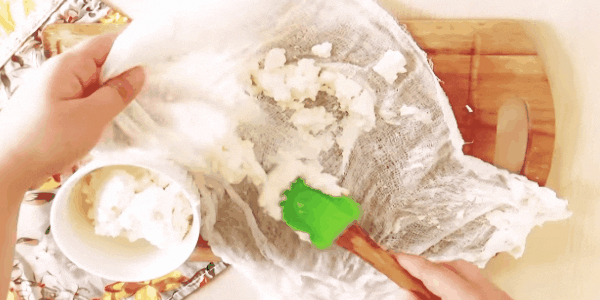11 main rules of delicious home-made cottage cheese
1. Cottage cheese can be made in two ways: with heating and without. It’s a matter of taste and convenience. However, the cottage cheese without heating gets a little more tender.
2. If you make cottage cheese from milk, take rustic. Especially if the prescription it should sour. But you can use the store milk of any fat content. The fatter it is, the fatter the cottage cheese will be.
3. Kefir, too, you can take any fat. Overdue kefir can be used only if you heat it.
4. The quantity and taste of cottage cheese depends on the quality of the original product. So when buying milk or kefir, you should not skimp.
5. You can cook cottage cheese in a saucepan or in a water bath. This is again a matter of convenience. Description of the cooking process on a water bath you will find in the recipe of cottage cheese from kefir.
6. Heat dairy products better in a pan made of aluminum or stainless steel with a thick bottom. Enameled dishes do not fit: everything can burn in it.
7. Cottage cheese is spread on a colander, covered with several layers of gauze. For the colander put a pot or some other capacity to drain the serum.
8. If you leave the cottage cheese in a colander for a couple of hours or even less, it will turn out to be wet.
9. To make the curd dry and crumbly, you need to tie the ends of the gauze and hang the bundle over the sink or pan for a few hours or even all night. Time depends on your preferences: the longer the serum drains, the dryer cottage cheese will be.
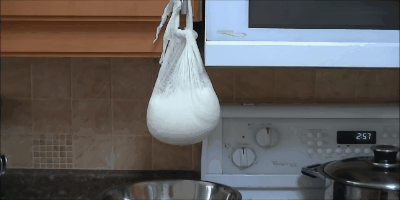
10. And that the cottage cheese kept the form, it is possible to put it under oppression.
11. The house curd is stored in the refrigerator for no more than four days.
1. Homemade cottage cheese from milk
This is the traditional way of cooking cottage cheese.
Ingredients
- 2 liters of milk.
Of this amount will be about 400 grams of cottage cheese.
Preparation
Leave the milk in a warm place for 1-3 days. Do not mix it. Time depends on the temperature in the room: the warmer, the quicker the milk will sour. To speed up the process, you can add in the milk 2 tablespoons of sour cream or a slice of black bread.
Milk should not be sour in the refrigerator. There it will get an unpleasant smell and can start to be bitter. If you notice that the milk in the fridge starts to sour, you better get it out so that it sneaks under suitable conditions.
Sour milk will look like a soft thick jelly, and around it will start to appear whey. Place the milk in a saucepan and put it on a low heat.
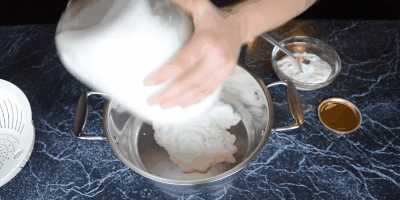
Cook, stirring occasionally. Do not overheat the milk, it should be a little warm. After 10-15 minutes from the beginning of cooking in the pan begin to form clots of cottage cheese. Remove the pan from the heat and let it stand for another time. Then shift the cottage cheese into a colander and leave to drain.
2. Homemade cottage cheese from milk without heating
Ready cottage cheese will be more gentle than in the first case.
Ingredients
- 2 liters of milk.
Of this amount will be about 400 grams of cottage cheese.
Preparation
Let the milk sour, as in the first method. Do not heat a thickened mass, but immediately throw it back on gauze.
3. Homemade cottage cheese from milk and lemon
Thanks to lemon juice, milk will sour much faster.
Ingredients
- 2 liters of milk;
- 1 lemon.
Of this amount will be about 350 grams of cottage cheese.
Preparation
Pour the milk into a saucepan. If you use rustic milk, then it must be brought to a boil and lowered by fire. If the milk is already pasteurized, then just heat it, but do not boil it.
Squeeze out the juice from the lemon – you should get about 60 ml. Then, in a thin trickle, pour the lemon juice into the milk and mix. Almost immediately, whey will begin to separate and curd clots will appear. As soon as this happens, remove the pan from the fire.
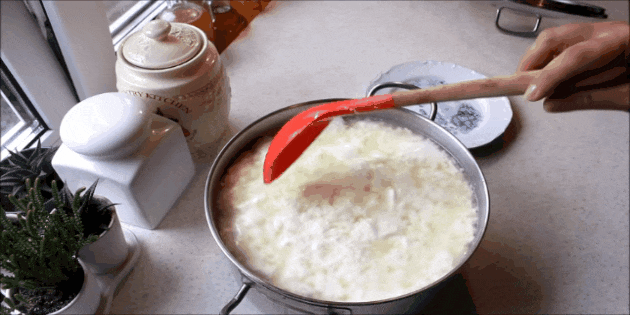
Leave it for a few minutes to cool slightly. Transfer the cottage cheese into a colander and allow the serum to drain.
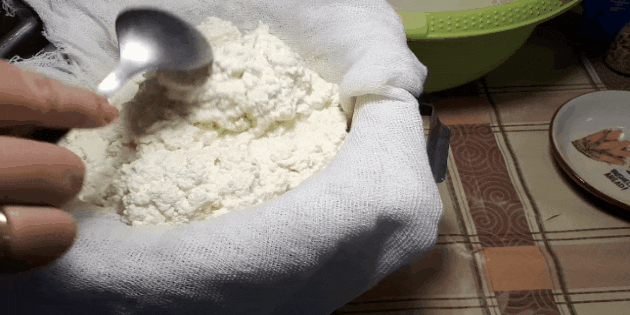
4. Homemade cottage cheese from milk and yogurt
Kefir also contributes to the rapid curtailment of milk. A very soft and delicate product is obtained from such a mixture.
Ingredients
- 1 liter of milk;
- 1 liter of kefir.
Of this amount will be about 300 grams of cottage cheese.
Preparation
Heat the milk almost to a boil. When the first bubbles appear, remove the pan from the heat and pour in kefir. Stir and leave until completely cooled.
After that, the serum and clots of cottage cheese will appear in the pan. They need to be put in the same way as in all other methods, to a colander covered with gauze.
5. Homemade cottage cheese from yogurt
From heated kefir you get a rather dense and crumbly cottage cheese.
Ingredients
- 1 liter of kefir.
Of this amount will be about 200 grams of cottage cheese.
Preparation
You will need two pans of different diameters. One of them must be free to fit into another. Fill the large pot half full. Bring the water to a boil over high heat.
In another saucepan, pour in kefir. After boiling, put a small saucepan in a large pan and heat the yogurt on low heat.
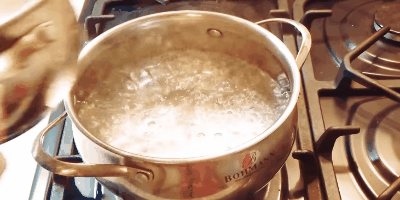
Kefir must break into cottage cheese and whey. When this happens, remove the pan from the heat and leave for 10 minutes. Transfer the cottage cheese into a colander and allow the serum to drain.
6. Homemade cottage cheese from frozen yogurt
And from the frozen kefir you will get a gentle air curd resembling cream cheese. It can be mixed with greens, podsolit and used for making sandwiches.
Ingredients
- 1 liter of kefir.
Of this amount will be about 200 grams of cottage cheese.
Preparation
It is best to take kefir in a packet: the bottle can crack during freezing, and the petrified kefir will be difficult to extract from it. If you only have bottled yogurt at hand, just pour it into a cellophane bag and tie it tight.
Put the bag in the freezer for the night. Kefir should become like a piece of ice. If in 10-12 hours kefir does not become solid as a stone, it means that it is substandard. From such a product you will get a liquid cottage cheese, reminiscent of sour cream.
Gently cut the package, put the contents in a colander and wrap in gauze.

Leave the yogurt at room temperature until completely thawed.
